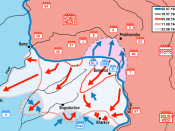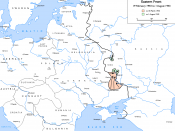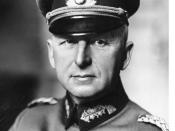Manstein's plan
The purpose of this paper is to explain the military significance of the Battle of Kursk. The Battle of Kursk was a decisive battle of World War II; it remains the largest armored battle of all time. While originally planned as a German offensive, the Soviet defense was so successful that they were able to turn it into a rout. This battle between two of the greatest commanders of the war, the Russian general Georgi Zhukov, and the German Field Marshal Erich von Manstein, effectively resulted in the end of German offensives on eastern front. Following Kursk, Germany was to be on the defensive. This paper will deal with two main aspects of the significance of Kursk: first, the results of what actually happened; second, what would have happened had von Manstein's plan been followed.
In February and March 1943 Manstein had completed a brilliant offensive during the Second Battle of Kharkov, leaving the front line running roughly from Leningrad in the north to Rostov in the south.
In the middle there was a large 200 km wide and 150 km deep salient in the lines between German forward positions near Orel in the north, and Manstein's recently captured Kharkov in the south .
Manstein pressed for a new offensive based on the same successful lines he had just pursued at Kharkov, when he cut off an overextended Soviet offensive. He suggested tricking the Soviets into attacking in the south against the desperately re-forming 6th Army, leading them into the Donets Basin in the eastern Ukraine. He would then turn south from Kharkov on the eastern side of the Donets River towards Rostov and trap the entire southern wing of the Red Army against the Sea of Azov.
German Command did not approve the plan, and instead...


